 W
WDuke Alexander of Württemberg was a Duke of Württemberg. The son of Frederick II Eugene, Duke of Württemberg and of Sophia Dorothea of Brandenburg-Schwedt. His sister Sophie Dorothea married Tsar Paul I of Russia.
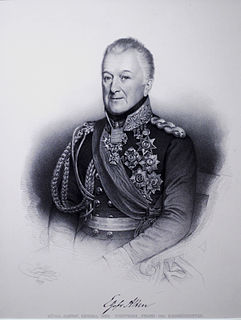 W
WField Marshal Sir Charles (Carl) August von Alten was a Hanoverian and British soldier who led the famous Light Division during the last two years of the Peninsular War. At the Battle of Waterloo, he commanded a division in the front line, where he was wounded. He later rose to the rank of Field Marshal in the Hanoverian army.
 W
WErnst Ludwig von Aster was a German officer and a highly decorated Prussian, Saxon and Russian general of the German Campaign of 1813 and the War of the Seventh Coalition.
 W
WFrederick August Charles, Prince of Hohenlohe-Öhringen was a German general of the Napoleonic Wars and nobleman of the house of Hohenlohe.
 W
WKonrad Ludwig Georg Baring was an officer in the army of the Electorate of Hanover and the British army's King's German Legion. Some sources also give his name as Baron Georg(e) von Baring.
 W
WFriedrich Wilhelm Graf von Bismarck was a German lieutenant general, diplomat and military writer. He wrote several major military-political works and military histories, which were very pro-Napoleon.
 W
WCharles became ruler of the Grand Duchy of Baden as its grand duke on 11 June 1811 and reigned until his death in 1818. He was born in Karlsruhe.
 W
WGraf Johann Friedrich von der Decken was a Hanoverian general and diplomat during the Napoleonic Wars.
 W
WBernhard Erasmus von Deroy from the Electorate of the Palatinate became a noted general officer in the army of Bavaria. His military career began shortly after the start of the Seven Years' War. During the French Revolutionary Wars he first served on the side of the Coalition against the French revolutionaries, then fought as an ally of the First French Empire during the Napoleonic Wars. Deroy and his colleague, Karl Philipp von Wrede, were dominant personalities in the Bavarian military during the era of Napoleon Bonaparte.
 W
WWilhelm Caspar Ferdinand Freiherr von Dörnberg was a German general. He was also known as 'Aufstandsdörnberg' or 'Uprising Dörnberg', for his part in the German campaign of the Napoleonic Wars. He also fought as a brigade commander at Quatre Bras and Waterloo.
 W
WFerdinand Heinrich Friedrich was a German nobleman and the last landgrave of Hesse-Homburg.
 W
WKarl August, sometimes anglicised as Charles Augustus, was the sovereign Duke of Saxe-Weimar and of Saxe-Eisenach from 1758, Duke of Saxe-Weimar-Eisenach from its creation in 1809, and grand duke from 1815 until his death. He is noted for the intellectual brilliance of his court.
 W
WMajor-general Friedrich Otto Gebhard von Kielmansegg was a German soldier and officer in the service of the Kingdom of Hanover who fought during the Waterloo Campaign.
 W
WKarl Friedrich von dem Knesebeck was a Prussian field marshal and military adviser in the Napoleonic Wars, best known for designing the campaign plan of the Battle of the Nations and the subsequent invasion of France. As aide-de-camp to the king from 1813, and thereby his closest military advisor, he was a key figure in Prussia's military policy throughout the War of the Sixth Coalition and the subsequent Congress of Vienna.
 W
WMajor-General August von Kruse, was a general in the army of the Duke of Nassau during the Napoleonic Wars and an experimental farmer in his retirement.
 W
WCharles Christian Erdmann Ritter and Edler von Le Coq was a Saxon officer who rose to the rank of Lieutenant-General and was the commanding officer of the Royal Saxon army.
 W
WLeopold Victor Friedrich of Hesse-Homburg was a prince of Hesse-Homburg.
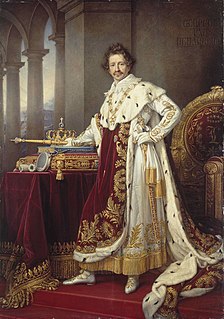 W
WLudwig I or Louis I was king of Bavaria from 1825 until the 1848 revolutions in the German states.
 W
WDuke Charles of Mecklenburg was a member of the House of Mecklenburg-Strelitz and a Prussian soldier who served in the Napoleonic Wars. From 1827 until his death he was President of the Prussian State Council.
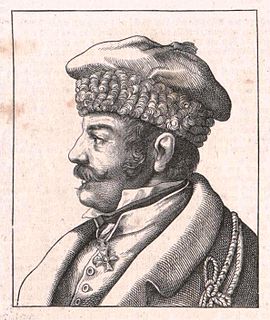 W
WKarl Friedrich Leberecht Graf von Normann-Ehrenfels was a Württembergian soldier who fought in the Napoleonic Wars. As a Philhellene he sailed to Greece to assist the Greek rebels in the Greek War of Independence, and died there of wounds received in the Battle of Peta.
 W
WClemens or Klemens Wenzel Freiherr von Raglovich und zum Rosenhof was a Bavarian General der Infanterie.
 W
WGerhard Johann David von Scharnhorst was a Hanoverian-born general in Prussian service from 1801. As the first Chief of the Prussian General Staff, he was noted for his military theories, his reforms of the Prussian army, and his leadership during the Napoleonic Wars. Scharnhorst limited the use of corporal punishments, established promotion for merit, abolished the enrollment of foreigners, began the organization of a reserve army, and organized and simplified the military administration.
 W
WFriedrich Karl Freiherr von Tettenborn was a famous cavalry commander in the Austrian and Russian armies during the Napoleonic Wars.
 W
WJohann Adolf, Freiherr von Thielmann was a Saxon soldier who served with Saxony, Prussia and France during the Napoleonic Wars.
 W
WJohann Nepomuk Joseph Florian, Graf von Triva was a Bavarian General der Artillerie. He was the first War Minister of the Bavarian kingdom.
 W
WJohann Ludwig Reichsgraf von Wallmoden-Gimborn was a German lieutenant-general and art collector.
 W
WWilliam I was King of Württemberg from 30 October 1816 until his death.
 W
WWilliam II was the penultimate Elector of Hesse.
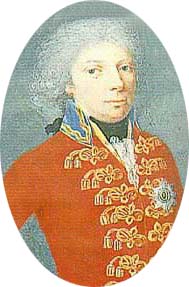 W
WDuke William Frederick Philip of Württemberg was a prince of the House of Württemberg and a minister for war.
 W
WWilhelm was joint sovereign Duke of Nassau, along with his father's cousin Frederick Augustus, reigning from 1816 until 1839. He was also sovereign Prince of Nassau-Weilburg from 1816 until its incorporation into the duchy of Nassau.
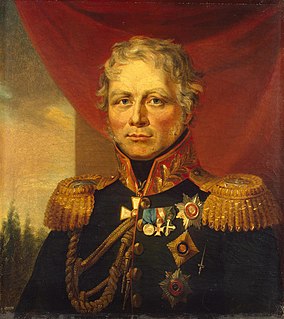 W
WFerdinand Karl Friedrich Freiherr von Wintzingerode was a German nobleman and officer in several different armies of the Napoleonic Wars, finally ending up as a general in the Imperial Russian army and fighting in the War of the Sixth Coalition against the French invasion of Russia and the subsequent campaigns in Germany and France. He appears in Tolstoy's War and Peace.
 W
WKarl Philipp Josef, Prince von Wrede was a Bavarian field marshal. He was an ally of Napoleonic France until he negotiated the Treaty of Ried with Austria in 1813. Thereafter Bavaria joined the coalition.
 W
WLudwig von Wurmb was a lieutenant general in the army of Hesse-Kassel during the Napoleonic Wars. In the English-speaking world he is probably best known for his service for the British in North America during the War of American Independence, when, as a lieutenant colonel, he commanded the Hessian Jäger corps in campaigns throughout the war. His military service career spanned more than 50 years.
 W
WDuke Eugen of Württemberg was a German prince and a General of Infantry in the Imperial Russian Army during the Napoleonic Wars.
 W
WJohann David Ludwig Graf Yorck von Wartenburg was a Prussian Generalfeldmarschall instrumental in the switching of the Kingdom of Prussia from a French alliance to a Russian alliance during the War of the Sixth Coalition. Ludwig van Beethoven's "Yorckscher Marsch" is named in his honor.